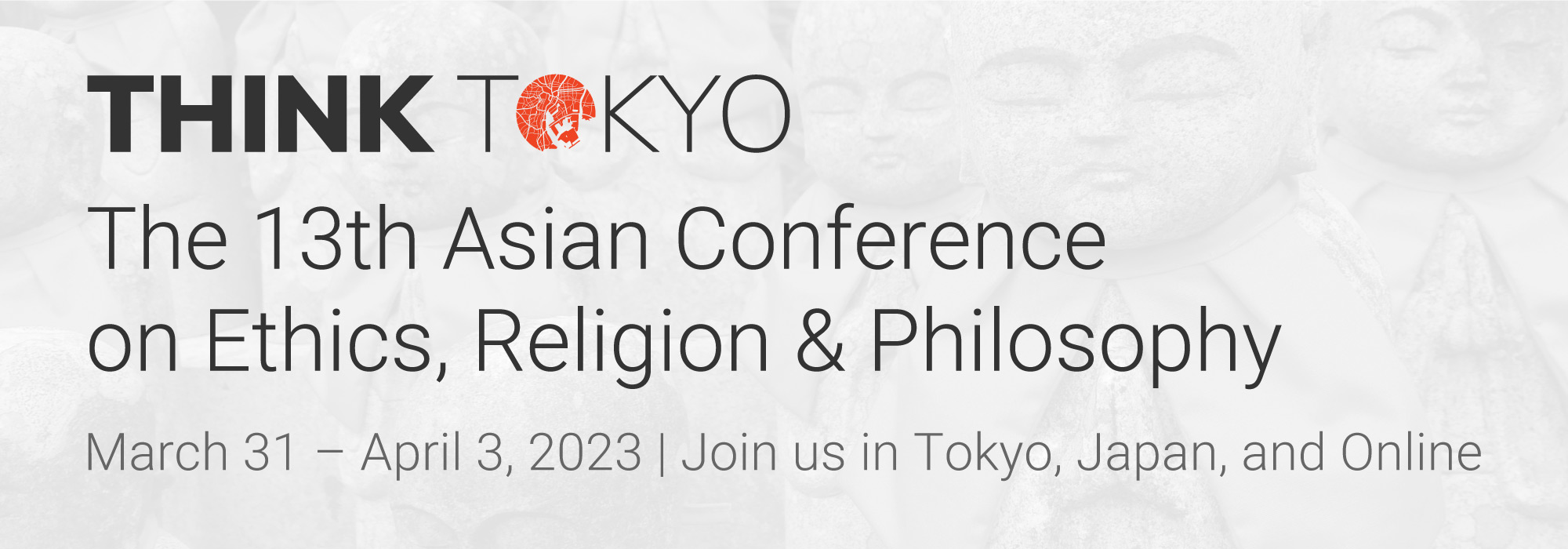Conference Outline
13:30-15:00: Pre-Conference Registration | Toshi Center Hotel, Room 702
15:00-17:00: Cultural Visit: Hanami in the Imperial Gardens
17:00-19:00: Conference Meet & Greet | GARB Central
09:00-10:00: Conference Registration & Coffee | Orion Hall (5F)
10:00-10:05: Announcements & Welcome | Orion Hall (5F)
10:05-10:15: Welcome Address & Recognition of IAFOR Scholarship Winners | Orion Hall (5F)
10:15-11:00: Keynote Presentation | Orion Hall (5F)
Whose Time Am I Spending? Nonzero-sum Time Perception Promotes Psychological Well-being and Prosociality
Yu Niiya, Hosei University, Japan
11:00-11:15: Coffee Break | Orion Hall (5F)
11:15-12:00: Keynote Presentation | Orion Hall (5F)
Ships in the Night: Expansion of the Separation of Politics and Religion in Japan as the U.S. Supreme Court Abandons the Separation of Church and State
Frank Ravitch, Michigan State University College of Law, United States
12:00-13:00: Lunch Break
13:00-13:45: Panel Presentation | Orion Hall (5F)
Recent Developments Concerning the Separation of Religion and State in Contemporary Japan
Frank Ravitch, Michigan State University College of Law, United States
Haruko Satoh, Osaka University, Japan
Brian Victoria, Oxford Centre for Buddhist Studies, United Kingdom
Joseph Haldane, The International Academic Forum, Japan (Moderator)
13:45-14:15: Featured Presentation | Orion Hall (5F)
Are Modern Understandings of Karma the Teaching of Shakyamuni Buddha?
Brian Victoria, Oxford Centre for Buddhist Studies, United Kingdom
14:15-14:30: Conference Photograph
14:30-14:45: Coffee Break | Orion Hall (5F)
14:45-15:45: Conference Poster Session | Orion Hall (5F)
15:45-16:30: Featured Workshop Presentation | Orion Hall (5F)
Aging Data: The National Archive of Computerized Data on Aging
James McNally, University of Michigan, United States
Kathryn Lavender, University of Michigan, United States
09:00-09:30: Registration & Coffee
09:30-11:10: Onsite Parallel Presentation Session 1
Room 703: Qualitative/Quantitative International Psychology
Room 704: Mental Health
Room 705: Psychology and Education
Room 707: Vision and Hearing Health
Room 708: Philosophy in Arts, Culture & Technology
11:10-11:25 Coffee Break
11:25-12:40: Onsite Parallel Presentation Session 2
Room 703: Qualitative/Quantitative Research in any other area of Psychology
Room 704: Psychology and Society
Room 705: Psychology and Education
Room 707: Aging & Gerontology
Room 708: Ethics & Philosophy in Education & Language
12:40-13:40: Lunch Break
13:40-15:20: Onsite Parallel Presentation Session 3
Room 703: Qualitative/Quantitative Research in any other area of Psychology
Room 704: Mental Health (COVID-19)
Room 705: Psychology and Education
Room 707: Aging and Gerontology
Room 708: Ethics
15:20-15:35: Coffee Break
15:35-17:15: Onsite Parallel Presentation Session 4
Room 703: Psychology (Media & Design)
Room 704: Mental Health
Room 705: Psychology and Education
Room 707: Navigating Aging and Illness
Room 708: Interdisciplinary Religion
17:20-18:00: Onsite Parallel Presentation Session 5
Room 703: Calm and Clear – Meditation Workshop
Room 708: Taemong Writing Workshop
19:00-21:00: Conference Dinner
Pre-registration is required
Location: Gonpachi Nishi-Azabu
09:00-09:25: Registration & Coffee
09:25-10:15: Featured Discussion
| Room 703
Curious about Curiosity
Dani S. Bassett, University of Pennsylvania, United States
Perry Zurn, American University, United States
10:15-10:30: Coffee Break
10:30-12:10: Onsite Parallel Presentation Session 1
Room 703: Mental Health
Room 704: Psychology and Education
Room 705: Mental Health
Room 707: Support Systems
Room 708: Health & Psychology
12:10-13:10: Lunch Break
13:10-14:25: Onsite Parallel Presentation Session 2
Room 703: Communication & Psychology
Room 704: Focus on Teachers
Room 705: Mental Health
Room 707: Aging and Gerontology (Health)
Room 708: Industrial Organisation, Leadership, & Training
14:25-14:40: Coffee Break
14:40-16:20: Onsite Parallel Presentation Session 3
Room 703: Aging and Psychology
Room 704: Focus on Teachers
Room 705: Mental Health
Room 707: Aging and Gerontology
Room 708: Linguistics/Language & Psychology
16:20-16:30: Onsite Closing Session
08:55-09:00: Online Welcome Address
09:00-11:05: Online Parallel Presentation Session 1
Room A: Mental Health
Room B: Aging and Gerontology
11:05-11:20: Break
11:20-12:35: Online Parallel Presentation Session 2
Room A: Qualitative/Quantitative Research in any other area of Psychology
Room B: Philosophy
12:35-12:50: Break
12:50-14:30: Online Parallel Presentation Session 3
Room A: General Psychology
Room B: Religion and Education
14:30-14:45: Break
14:45-16:00: Online Parallel Presentation Session 4
Room A: International Psychology
Room B: Religion
16:00-16:10: Break
16:10-16:55: Keynote Presentation | Online
To Be Young and Depressed: Higher Prevalence Rates for Depression in Youngsters in the Netherlands
Jan Spijker, Radboud University, The Netherlands
16:55-17:00: Online Closing Session
The above schedule may be subject to change.
Featured Presentations
-
 Curious About CuriosityFeatured Discussion: Dani S. Bassett & Perry Zurn
Curious About CuriosityFeatured Discussion: Dani S. Bassett & Perry Zurn -
 Are Modern Understandings of Karma the Teaching of Shakyamuni Buddha?Featured Presentation: Brian Victoria
Are Modern Understandings of Karma the Teaching of Shakyamuni Buddha?Featured Presentation: Brian Victoria -
 Recent Developments Concerning the Separation of Religion and State in Contemporary JapanPanel Presentation: Frank Ravitch, Haruko Satoh, Brian Victoria, Joseph Haldane (Moderator)
Recent Developments Concerning the Separation of Religion and State in Contemporary JapanPanel Presentation: Frank Ravitch, Haruko Satoh, Brian Victoria, Joseph Haldane (Moderator) -
 Ships in the Night: Expansion of the Separation of Politics and Religion in Japan as the U.S. Supreme Court Abandons the Separation of Church and StateKeynote Presentation: Frank Ravitch
Ships in the Night: Expansion of the Separation of Politics and Religion in Japan as the U.S. Supreme Court Abandons the Separation of Church and StateKeynote Presentation: Frank Ravitch -
 To Be Young and Depressed: Higher Prevalence Rates for Depression in Youngsters in the NetherlandsKeynote Presentation: Jan Spijker
To Be Young and Depressed: Higher Prevalence Rates for Depression in Youngsters in the NetherlandsKeynote Presentation: Jan Spijker -
 Whose Time Am I Spending? Non-zero-sum Time Perception Promotes Psychological Well-being and ProsocialityKeynote Presentation: Yu Niiya
Whose Time Am I Spending? Non-zero-sum Time Perception Promotes Psychological Well-being and ProsocialityKeynote Presentation: Yu Niiya
Conference Programme & Abstract Book
The online version of the Conference Programme & Abstract Book is now available for download. It contains access information, session information and a detailed day-to-day presentation schedule.
*Please be aware that the above schedule may be subject to change.
Important Information Emails
All registered attendees will receive an Important Information email and updates in the run-up to the conference. Please check your email inbox for something from "iafor.org". If you can not find these emails in your normal inbox, it is worth checking in your spam or junk mail folders as many programs filter out emails this way. If these did end up in one of these folders, please add the address to your acceptable senders' folder by whatever method your email program can do this.
Previous Programming
View details of programming for past ACERP conferences via the links below.






